
-
Find det rigtige foder til din kat eller hundTag denne quiz for at se, hvilket foder der kan være bedst for din firbenede ven.Find det rigtige foder til din kat eller hundTag denne quiz for at se, hvilket foder der kan være bedst for din firbenede ven.Udvalgte produkter
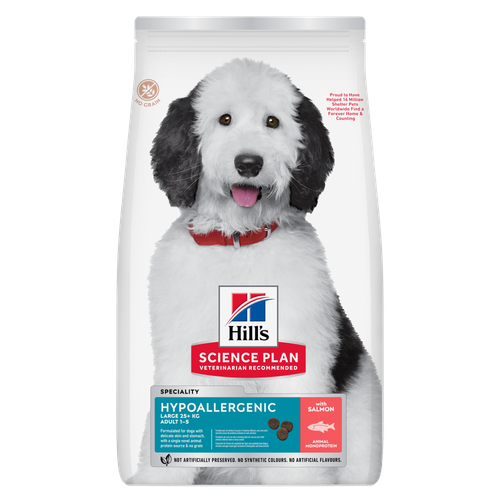 Hypoallergenic Large Breed Adult hundefoder med laks
Hypoallergenic Large Breed Adult hundefoder med laksHILL'S SCIENCE PLAN Hypoallergenic Medium Adult hundefoder med laks er et fuldfoder til voksne store hunderacer på 1-5 år. Det er sammensat til hunde med sart hud og mave, med begrænsede nye proteinkilder af høj kvalitet og uden korn.
køb nu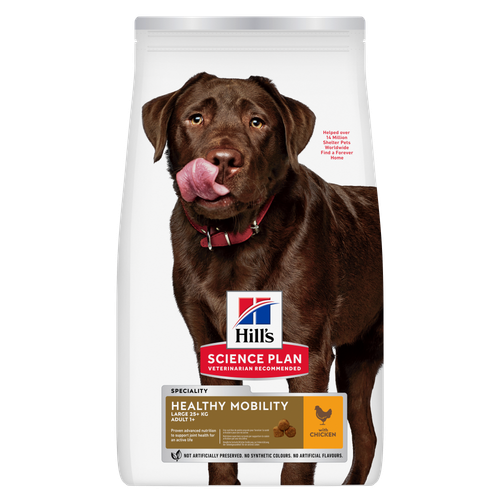 Healthy Mobility Large Breed Adult hundefoder
Healthy Mobility Large Breed Adult hundefoderHill's Science Plan Healthy Mobility Large Breed Adult hundefoder med kylling er avanceret ernæring til at understøtte ledsundheden og forbedre mobiliteten.
køb nu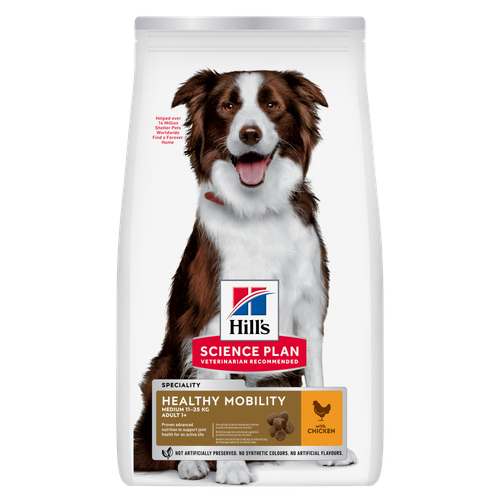 Healthy Mobility Medium Adult hundefoder
Healthy Mobility Medium Adult hundefoderHill's Science Plan Healthy Mobility Medium Breed Adult hundefoder med kylling er avanceret ernæring til at understøtte ledsundheden og forbedre mobiliteten.
køb nuLivsstadie-
Killing
2 Måneder – 12 Måneder
-
Voksen
1 År - 6 År
-
Ældre voksen
7 År – 11 År
-
Senior
11 År+
Udvalgte produkter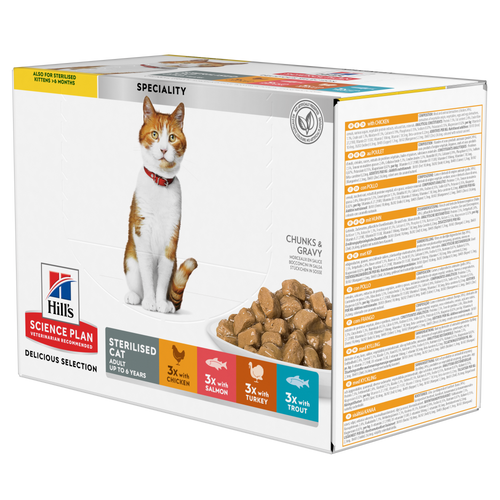 Sterilised Cat ADULT Kattefoderkøb nu
Sterilised Cat ADULT Kattefoderkøb nu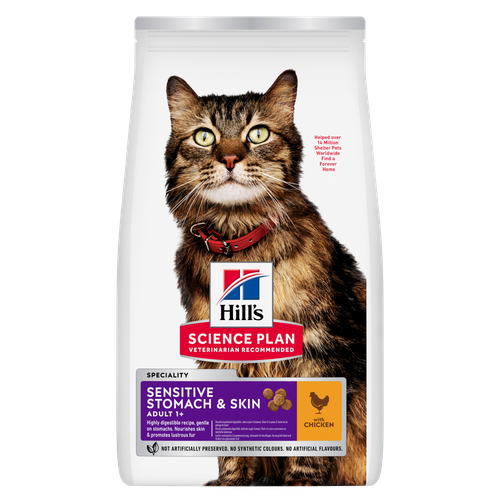 Sensitive Stomach & Skin Kattefoder
Sensitive Stomach & Skin KattefoderHill's Science Plan Sensitive Stomach & Skin Adult kattefoder med kylling er et komplet foder til voksne katte, der understøtter en sund fordøjelse og optimal hudpleje.
køb nu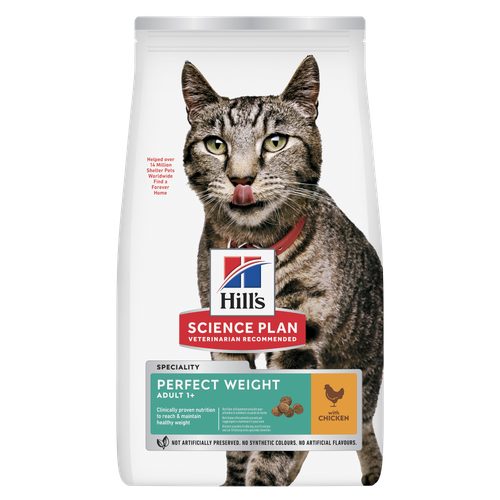 Perfect Weight Adult kattefoder med kylling
Perfect Weight Adult kattefoder med kyllingHill's Science Plan Perfect Weight Adult Kattemad med kylling er klinisk dokumenteret ernæring til at opnå og bevare en sund vægt.
køb nu -
Killing
-
Til hundeejere
- Hundetips og artikler
-
Hundesundhedskategori
- Vægthåndtering
- Foder- og miljøfølsomheder
- Urinveje
- Fordøjelse
- Led
- Nyre
-
Hundens livsstadie
- Hvalpeernæring
- Voksenernæring
- Seniornering
Til katteejere- Kattetips og artikler
-
Kattesundhedskategori
- Vægthåndtering
- Hud- & foderfølsomheder
- Urinveje
- Fordøjelse
- Nyre
-
Kattens livsstadie
- Killingeeræring
- Voksenernæring
- Seniorernæring
Udvalgte artikler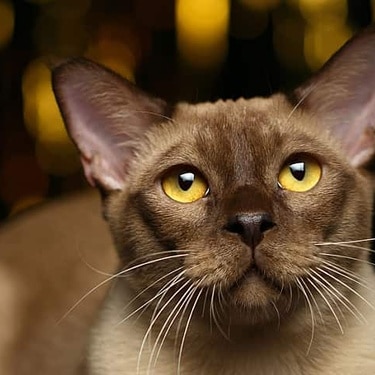 Opnåeligt nytårs opløsninger med dit kæledyr | Hill's Pet
Opnåeligt nytårs opløsninger med dit kæledyr | Hill's PetVi kender dem alle..nytårsforsæt! Mange af os sætter os mål for det nye år, som vi ikke altid når.
læs mere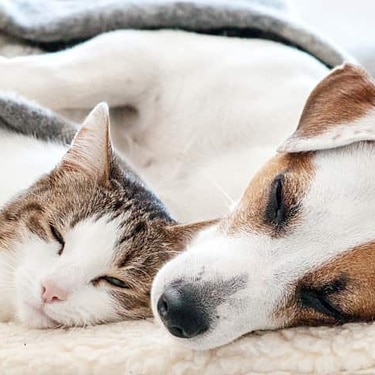 Sådan tager du din hunds eller kats temperatur
Sådan tager du din hunds eller kats temperaturAt lære at tage din hunds temperatur (og endda din kats temperatur) er et tydeligt bevis på, at en kæledyrsforælder er engageret i dit kæledyrs sundhed.
læs mere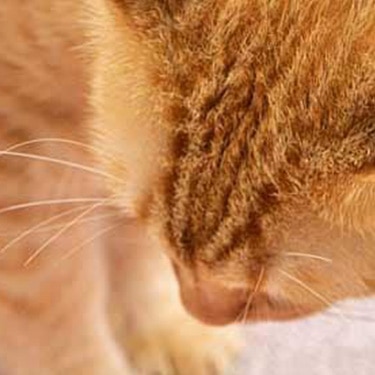 Krystaller og sten i urin hos hunde og katte
Krystaller og sten i urin hos hunde og katteLær om årsagerne til og behandlingerne af krystaller i urin hos hunde og katte, så du kan bevare deres sundhed. Besøg Hill's Pet DK og få omfattende råd om sunde urinveje.
læs mere -


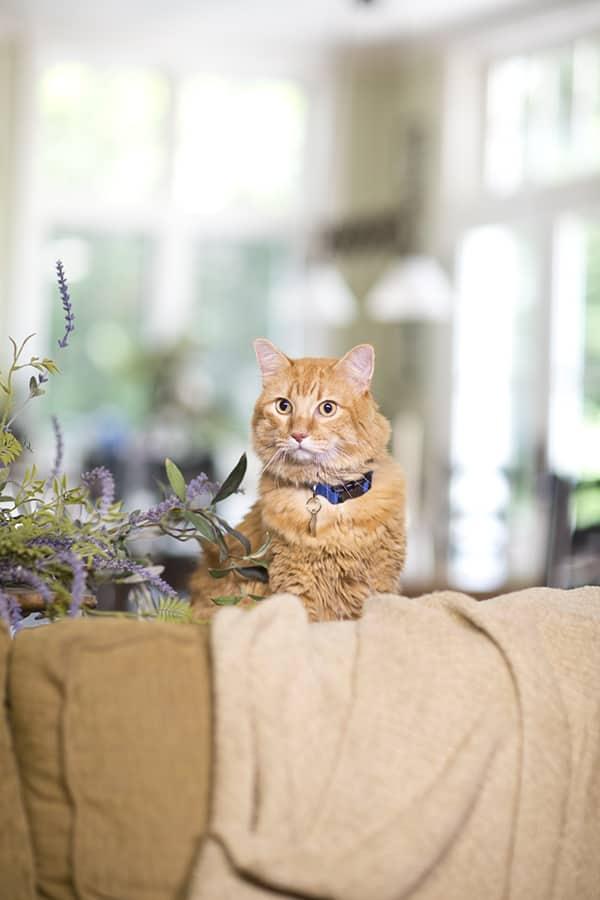
Ligesom hos mennesker består cirka to tredjedele af kattens krop af vand. Og som alle andre dyr har katte brug for en sund mængde vand for at overleve og bevare deres sundhed. Når de lever i naturen, får de noget af deres vand fra væskeindholdet i deres føde, f.eks. byttedyr som insekter, fugle og gnavere, og resten fra vandløb og andre vandkilder. Din huskat har en meget anderledes kost, og selvom du måske giver den lidt vådfoder, får den det meste af sit vand i en skål!
Hvor meget vand skal en kat drikke?
Mængden af vand, som din kat har brug for, afhænger af dens størrelse, aktivitetsniveau, helbred og foder, men ligger mellem 40-70 ml pr. kg kropsvægt pr. dag. Hvis du mener, at din kat ikke drikker nok vand, er der et par måder at opmuntre den til at drikke på.
Placeringen er afgørende. Sæt et par vandskåle rundt omkring i huset på steder, hvor der ikke er så meget trafik. Ideelt set bør du have en vandskål mere, end du har katte. Vandskåle bør heller ikke placeres i nærheden af kattebakken. Det kan gøre din kat utilpas og få den til at holde op med at spise, drikke og bruge kattebakken. Vi vil jo nødig tvinges til at indtage alle vores flydende forfriskninger på toilettet! De bryder sig måske ikke engang om at have mad- og vandskålene i nærheden af hinanden. Det skyldes, at katte i naturen har udviklet sig til ikke at drikke i nærheden af deres mad, hvis vandet er snavset af byttedyrets kadaver.
Nogle katte er meget omhyggelige med at drikke vand. Din kat kan måske bedre lide koldt vand, så smid et par isterninger i skålen. Hvis den har tendens til at vælte, skal du skifte til en bredere udgave med gummibund. Den kan måske ikke lide smagen af vandet, så hvis du bruger en plastikskål, så prøv at skifte til en metal-, keramik- eller glasskål. Du bør også udskifte din kats vand regelmæssigt for at holde det friskt.
Nogle katte vil slet ikke bruge en skål og vil hellere drikke direkte fra vandhanen. I naturen vil katte normalt kun drikke vand i bevægelse, da de har lært, at det hjælper dem med at undgå at blive syge. Hvis du ser, at din kat hele tiden vælter vandskålen og drikker vandet, mens det løber ud over gulvet, har den det sandsynligvis bedre med at drikke vand i bevægelse. Overvej vandfontæner til katte, som konstant får vandet til at cirkulere.
Du kan også tilføje mere vand til din kats kost. Vådfoder har et meget højere vandindhold end tørfoder, men hvis du foretrækker tørfoder, kan du prøve at tilsætte lidt vand til foderpillerne. Nogle katte bryder sig ikke om konsistensen af opblødte foderpiller, men hvis din kat gør, er det en nem måde at øge dens vandindtag på. En kombination af tørfoder og vådfoder er også en mulighed, og det er en god måde at holde din kats smag fleksibel på og forhindre, at den bliver afhængig af enten våd- eller tørfoder.
Uanset hvilken metode du vælger, er det vigtigt at opmuntre din kat til at drikke vand. Mange tror måske, at mælk er en god erstatning, men det er kun en myte, og det kan endda give fordøjelsesproblemer. At få din kat til at drikke vand er lige så vigtigt som at give den den rigtige ernæring.


Lækre Tips
Killinger kan have brug for flere besøg i deres første leveår for at få vaccinationer. Voksne katte har som regel gavn af et årligt sundhedstjek, mens ældre eller særligt plejekrævende katte kan have behov for hyppigere besøg.
Dehydrering hos katte
Alle dyr koncentrerer deres urin, men katte nedstammer fra ørkenkatte, hvilket betyder, at de kan overleve på mindre mængder vand end andre dyr. De har ikke en særlig stor tørst, så de føler ikke behov for at drikke vand særlig ofte. Hvis din kat er dehydreret, ved du det måske ikke, før der opstår et problem. Dehydrering hos katte kan føre til blæreproblemer og urinvejsproblemer, herunder nyresygdomme, blæresten og sygdomme i kattens nedre urinveje. Blæresten kan føre til livstruende blokeringer af urinrøret, især hos hankatte.
Der er flere måder, hvorpå du kan se, om din kat er dehydreret. En af de bedste tests til at se, om din kat er dehydreret, er at klemme forsigtigt på kattens hud og trække opad. Hvis huden ikke hurtigt vender tilbage til sin normale position, når du slipper, er din kat dehydreret. Jo langsommere din kats hud falder tilbage, jo mere dehydreret er den. Vær også opmærksom på tegn på alvorlig dehydrering: hiven efter vejret, depression, manglende appetit, indsunkne øjne, tør mund, øget sløvhed og øget hjerterytme.
Hvad hvis din kat drikker meget vand?
Selvom vand er livsnødvendigt, kan ændringer i tørst være et af de første tegn på mange sygdomme, som f.eks. nyresygdom, problemer med blodsukkeret eller leversygdom.
Jo mere du ved, hvad der er normalt for netop din kat, jo tidligere vil du opdage, hvis dens vaner ændrer sig. Hvis noget har ændret sig - f.eks. hvis du er gået fra vådfoder til tørfoder - er en stigning i vandindtaget sandsynligvis ikke noget at bekymre sig om. Mængden, de drikker, påvirkes også af vejret, så forvent, at de har brug for mere i de varmere måneder. Men hvis du ikke kan komme i tanke om en fornuftig forklaring på ændringen, kan en mærkbar stigning i drikkeriet være et tegn på et problem, især hvis du bemærker andre tegn som vægtændringer eller ændringer i appetitten.
Når det drejer sig om tørst, kan ændringer i begge retninger betyde problemer. Lær din kat at kende. Prøv at få en nogenlunde idé om, hvor ofte du ser dem drikke, og hvordan det ændrer sig i løbet af året. Hav også en idé om, hvor meget vand der normalt er tilbage i skålene, når du fylder dem op, for du vil ikke altid være i nærheden og kunne se din kat drikke.
Hvis du er bekymret for, om din kat ikke drikker nok, er dehydreret eller drikker for meget vand, skal du tage den med til dyrlægen. Din dyrlæge vil foretage en klinisk undersøgelse, men vil måske også tage nogle blodprøver for at se efter mulige problemer. Som med de fleste andre ting gælder det, at jo tidligere du får hjælp og en diagnose, jo større chance er der for, at problemet kan håndteres. Og selvfølgelig kan din dyrlæge berolige dig og forsikre dig om, at alt er godt med din firbenede ven.
Anmeldt af Dr. Hein Meyer, DVM, PhD, Dipl-ECVIM-CA og Dr. Emma Milne BVSc FRCVS


En af vores medarbejdere har udarbejdet denne artikel til dig
Anbefalede produkter til katte med nyreproblemer

Hill's Science Plan Perfect Weight Adult Kattemad med kylling er klinisk dokumenteret ernæring til at opnå og bevare en sund vægt.

Hill's Science Plan Sensitive Stomach & Skin Adult kattefoder med kylling er et komplet foder til voksne katte, der understøtter en sund fordøjelse og optimal hudpleje.

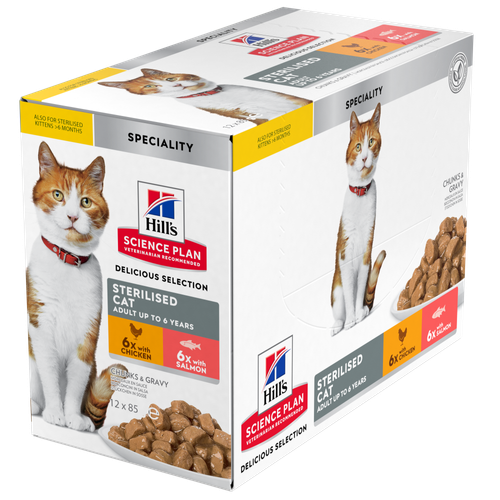
Relaterede artikler
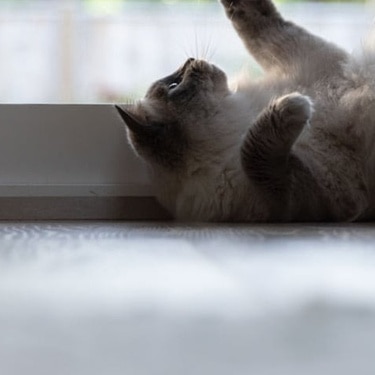
Fodringstid kan være en fantastisk mulighed for at knytte bånd mellem dig og din kat. Find ud af, hvordan du får mest muligt ud af fodringen og skaber en sund vane med HIll's Pet DK.
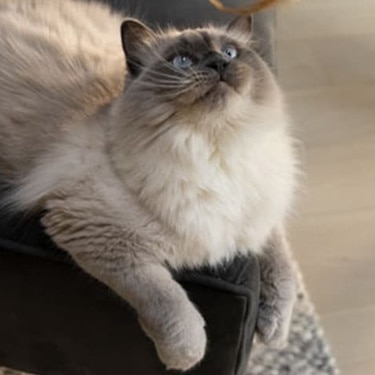
Vådfoder kan være en sand fornøjelse for din kats smagsløg og et godt valg til den kræsne spiser. Se, hvor meget foder du bør give med Hill's Pet DK.
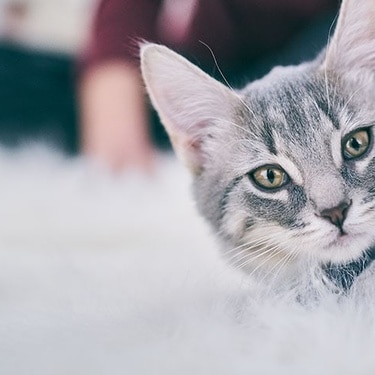
Det er vigtigt at fodre kattekillingen den rigtige mængde foder med de rigtige intervaller, men det kan være svært - foderkravene varierer meget fra den ene killing til den anden.
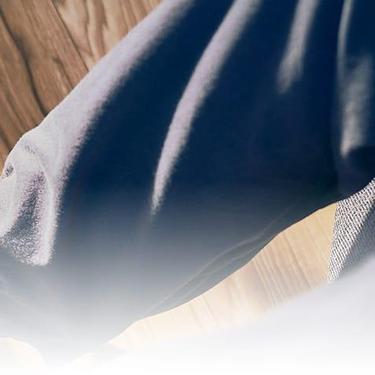
Oplev sjove og engagerende kattelege, der samtidig er en god kilde til motion. Udforsk spændende måder at holde din kat aktiv og underholdt på!

Sæt din kat på diæt uden at den opdager det
Vores kaloriefattige sammensætning hjælper dig med at kontrollere din kats vægt. Den er fyldt med protein af høj kvalitet til at opbygge slanke muskler og lavet med udvalgte ingredienser for et velsmagende og nærende måltid. Klinisk dokumenterede antioxidanter, vitamin C+E, hjælper med at styrke et sundt immunsystem.
Sæt din kat på diæt uden at den opdager det
Vores kaloriefattige sammensætning hjælper dig med at kontrollere din kats vægt. Den er fyldt med protein af høj kvalitet til at opbygge slanke muskler og lavet med udvalgte ingredienser for et velsmagende og nærende måltid. Klinisk dokumenterede antioxidanter, vitamin C+E, hjælper med at styrke et sundt immunsystem.

